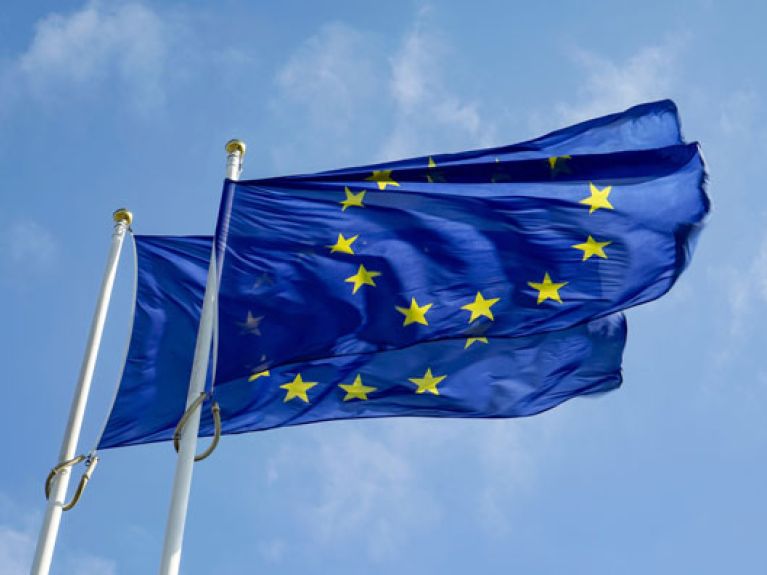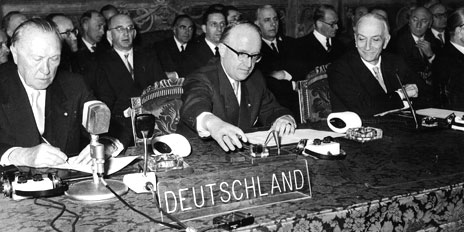Sixty years on
The Treaty of Rome in 1957 initiated an important fresh start. Sixty years later Europe must decide whether it wants to be a world power or gambles away its opportunities.

25 March 1957 was no ordinary day in Europe. Twelve years after the end of the Second World War the heads of government and foreign ministers of six European countries gathered in the Hall of Horatians and Curiatians at the Palazzo dei Conservatori on Capitoline Hill in Rome. Under the eyes of frescos depicting battle and war scenes from Roman antiquity and observed by statues of Pope Urban VIII and Pope Innocent X, they wanted to make a fresh start in the order of European states. Following a 30-year “European civil war” that had shaken all the values of Western civilisation between 1914 and 1945, peace was again to become possible between the participating states of Europe.
Signing of two treaties
This was the spirit in which the representatives of the six founding countries – Belgium, France, Germany, Italy, Luxembourg and the Netherlands – signed two documents: the Treaty establishing the European Economic Community (EEC) and the Treaty establishing the European Atomic Energy Community (EURATOM).

Before the signing of the treaties, as a matter of course, everyone attended a church service at the Roman Catholic Basilica of Saint Lawrence outside the Walls. Alcide de Gasperi, the Italian foreign minister who died in 1954, is buried in this stational church of the third Sunday in Lent. A border crosser between South Tyrol in Habsburg Austria and his cultural home of Italy, de Gasperi was one of the political saints of the new Europe alongside Robert Schuman, who died in 1963.
Six different perspectives
All those present in Rome were concerned to see a reorganisation of the European state order. Each of them had a different national history and therefore a different goal in mind: the Benelux countries of Belgium, the Netherlands and Luxembourg realised it would be most beneficial to them if the larger countries around them lived in peace. Italy had long seen itself as the cultural cradle of Europe and the driving force for a federal union that would give new shape to the old Roman idea of confederation (foedus). After the two crises of 1956 (Suez Crisis and Hungarian Uprising) France now understood that it would have to realise its power political ambitions inside Europe. Robert Schuman and Jean Monnet prepared the intellectual-political path to transforming antagonism towards Germany into a peace based on security with Germany. The gathering in Rome meant two things for the Federal Republic of Germany: moral rehabilitation after the catastrophe of the Second World War initiated by the German Reich and keeping open the “German question” in the face of the country’s division after the defeat of Hitler Germany.
“Ever closer union”
The representatives of the six founding countries of the EEC and EURATOM were brought together by the Cold War and fears of an expansionist Soviet Union. In the end, this pressure prevailed over all the contradictions and differences arising out of the tragedy of the self-destruction of Europe in two world wars and initiated a shift towards a new perspective: one of an “ever closer union among the European peoples”. These words are found in the preamble of the Treaty of Rome of 25 March 1957, which came into force on 1 January 1958. Since that time work on the institutions and structures that make up not only the union of states but also the union of citizens has continued rather like a rollercoaster. A European society that would support both does not yet exist – the greatest deficit at a time of rampant Euroscepticism.
World power ambitions of individual countries
No less significant for the further advance of European integration six decades after the signing of the Treaty of Rome is a second omission that has remained since 1957: the loss of an awareness of the connection between the Roman renewal of Europe and the suppressed but unvanquished world power ambitions of individual countries that in that respect have not yet come to terms with a union. The compass for a way of finding the global role of the peoples of Europe and its ever closer union was calibrated in 1957: Germany remained on its course of moral reconstruction that took it all the way to the very unilateral “welcome culture” for refugees in 2015. France became a partner for Europe while it simultaneously cultivated its global destiny. In 1957 the territory of present-day Algeria was still an integral part of the French Republic – and had been since at least 1848. France saw European integration as a path to renewed strength since the time of overseas empires was coming to an end. At the same time, Paris wanted to keep the British at arm’s length, because competition for leadership in Europe would not become easier with a United Kingdom that also still harboured global ambitions.
What role does Europe play in the world?
In 2017, on the 60th anniversary of the Treaty of Rome, the question of Europe’s global role remains and continues to reappear on the agenda: instead of the imperial ambitions of individual countries there is now the discordant question of how each country can assert itself – and how a common foreign, security and defence policy can be built nonetheless. After the Brexit referendum the Britons want to go it along and become “global Britain”. The French are still inspired by their “mission civilisatrice” and yet simultaneously divided about whether this idea should be realised by universal republicanism or a self-protecting cultural nation. The people of the Netherlands are experiencing a similar situation, although inside their country they are structurally more attuned to power sharing than the French. The Belgians have long since lost faith in their global power, which in 1957 was still magnified by its colonial possession in Congo with its uranium resources; EURATOM failed long ago. The Italians do not really know how they can combine pride in their country, which presented Europe with the garden of its culture, with a political leadership role that can advance the originally Italian idea of a federal Europe at a time in which there is increasing talk of a core Europe – from which the Italians are afraid of being excluded. Finally, the Germans are reflecting more than ever on how they should effect an exit from the Biedermeier parochialism of the years between 1957 and 2017 – without in the process once again remaining “undisputed” masters in an empire of dreams, to quote Heinrich Heine; leaving everything how it was when it was good would probably guarantee the loss of most of what we really want to preserve about and in today’s EU. The establishment of robust joint protection of Europe’s external borders is the current consensus formula in the EU, but it does not demonstrate a truly convincing and active will to shape the future – neither internally nor externally.
Important decisions on the 60th anniversary
On the 60th anniversary of its foundation the EU is wrestling with damage limitation and dealing with the consequences of uncompleted earlier steps towards integration. One thing is clear in the face of massive problems with multiculturalism and the unchecked pressure of migration: the fate of the peoples of Europe, which the British historian Arnold Toynbee once called “a peninsula of Asia”, will no longer be decided by East-West conflict, but by the result of the emancipation of the peoples of the southern hemisphere. In the face of incomplete cultural, social, economic, political and legal globalisation, the justification for European integration presents itself in a completely new light: the reconciled peoples and states of the EU must decide whether they want to be a world power with the help of the EU that has become what it is because of the Treaty of Rome or whether they will gamble away the Renaissance that the Treaty of Rome made possible for them.
Prof Dr Ludger Kühnhardt is Director of the Center for European Integration Studies (ZEI) at the University of Bonn.
More about Germany in the European Union

